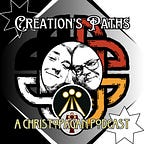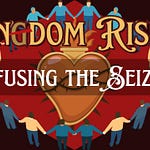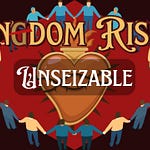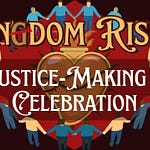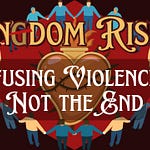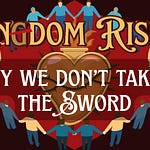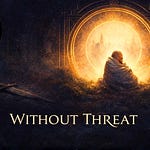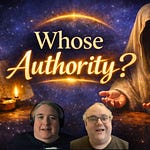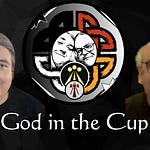In this episode, Charlie, delves into the significance of peacemaking. Drawing from both Christian and Druid traditions, and exploring the Beatitudes, the discussion emphasizes that true peacemaking starts within oneself and requires active engagement in creating consensus and understanding. The conversation covers cognitive biases, the paradox of tolerance, and the role of forgiveness in peacemaking, while also highlighting real-world examples such as the temporary peace between gangs during a concert. Charlie emphasizes the importance of personal peace as a foundation for wider societal harmony and urges viewers to examine their own internal conflicts and biases.
Support us on: https://ko-fi.com/cedorsett
Become a patron of the arts patreon.com/cedorsett
For Educational Resource: Wisdoms Cry https://wisdomscry.com
For all of the things we are doing at The Seraphic Grove go to Creation's Paths https://www.creationspaths.com/
BlueSky https://bsky.app/profile/creationspaths.com
Threads https://www.threads.net/@creationspaths
Instagram https://www.instagram.com/creationspaths/
Transcript:
Blessed are the peacemakers for, they shall be called the children of God. Huh. It sounds like an important thing to be talking about, especially with everything going on right now. And, you know, we did say in the last episode, we were going to be talking about peacemaking. So let's go ahead and do that.
Blessings from the one life to you and yours. My name is Charlie. I am a non-binary sci-fi fantasy author. And I've actually thought about whether I should still be introing myself that way. Or if I should be saying that I'm a Druid, I'm a Draoi whatever the word is that is most appropriate to the function that I'm placed.
But, I am a scifi fantasy author and I feel that is so core to my identity. That I should still be saying it.
Let me know what y'all think . How should I be introducing myself in here? And how should I be introducing my wonderful husband, Brian.
Yo. . I tried to mix it up today. I introduced myself differently .
So today we are going to be talking about a very important topic and that is blessed are the peacemakers. And especially if you're coming from the Druid tradition. The Christian tradition. ahem, yes. Even those of us who come from the Christian tradition. In the beatitudes and the sermon on the Mount, when Jesus delivers the new law, the new way that we are supposed to live. One of the things that he says at the very beginning, is blessed are the peacemakers for, they shall be called the children of God. It's something that is. Shockingly lacking in pop Christianity today. It is something that is very alive and well within modern druidry to a certain degree.
For those out there, that like to think of self first. Just thinking about. The second, most important thing Jesus said for all of us to do. Do unto others as we would have done unto ourselves. We deserve peace. We should have peace. So. Give peace. To others. So that you yourself will be deserving of that peace. As for the Christians out there, those that are following Christ teachings. Should be a. You know, Doing and behaving. Regarding peace.
Ahh, the golden rule, the heart of compassion. The proof if anybody needed it, that Jesus was a Pharisee. If you don't understand that just real quick. That statement doing to others as you would have them do unto you. Actually comes from Hillel, who is the founder of the pharisees. Who. According to legend, went to draw water from a well, and was asked by a Roman centurion in a mocking way. If you can explain to me. The law. While standing on one foot, I will convert to Judaism. And Hallel reportedly stood on one foot inside that what you find hateful. Do not do that to others. The rest is commentary.
And. Put his foot down, finished, collecting his water and said, I'll see you in the synagogue on Sabbath. That is the heart of. The original movement of the Pharisees. Also why Jesus talked about them so much.
peacemaking is core to this idea of compassion. It is something that we really don't talk about enough when we're talking about compassion. So what is . Peacemaking is. Different from strife . Think a lot of us get confused and that we think that peace is the aftermath or how you resolve war or conflict. And it is. But peacemaking actually starts a lot more subtle than that. This is why. Looking at a phrase like blessed are the peacemakers is so important. In the first wave of Christian writers Origin, the ever controversial Origin who was a heretic than not a heretic than a heretic. Again, not a heretic. And. ambiguous after that. Just where did the church landed on him. In his commentaries on the beatitudes. Says that blessed are the peacemakers actually involves being able to read the scriptures and make peace between the many ideas that are present within.
This is the heart of peacemaking. We have forgotten as a civilization, as a society. What it actually means to live in community. If you're only thinking about making peace when there is strife, when there is war, when there is conflict. Then you're not actively engaging in the act of peacemaking. Peacemaking is learning to live with those have different opinions. Peacemaking is learning to live with those who have different ideas about what might be the best path forward. Peacemaking is consensus building. Peacemaking is finding that road that we can walk together not just how to smooth over our conflicts and ending our fights.
A couple tools I found very helpful with understanding and executing that aspect of peacemaking ties back to our previous episode where we touched a little on nonviolence. It's being very mindful of that. when interacting with others. Is this action, a violation of another's free will. Any time that answer is yes, then.
The action is suspect. Not stopped.
That's true. That's true. It's suspect. And it should be highly scrutinized at that point because violent acts are going to generally result in violation of peace and not a peacemaking act. The second one is letting go. The art of letting go is so vital to peacemaking, especially when interacting with others. A lot of times, Others will perpetrate violence upon yourself and , it's one of the powers of forgiveness. That I think a lot of people don't understand. The first thing the healing that it does to yourself, once again, it goes back to in a way it's a selfish act. But it helps to, , let go. Once you realize that you are doing so much more harm to yourself holding on to that pain, to that violation, that was perpetrated upon your individual. The healing that results from that letting go is worth so much more and it makes peace.
So the reason I interrupted Brian there. In that. It's not always. Allowing everybody to do what they want. It comes down to, what's known as the paradox of tolerance. You cannot tolerate intolerance. This sounds like such a confusing thing, because if you're intolerant of intolerance than you're being intolerance, or you shouldn't tolerate being intolerant of indoc, Paradox. It sounds like a loop. That's bending back onto itself. The problem is that when intolerance is allowed to have free reign, It will take advantage of a tolerant space. Too overwhelming and push out marginalized voices. To push out those who. Would be likely to speak. Or feel unable to speak or uncomfortable speaking. You have to weed out those intolerant. Ideas. Those intolerant aspects of your public permissible discourse. Or you're letting them win and that really goes against the grain of a lot of what we think when we're talking about free speech and free will, all of those things. That we just will defeat them in the marketplace of ideas. We'll debate them into obscurity. We will show with facts and logic and reason that their intolerance is wrong. And that actually isn't how the human psyche works. So there are two main factors that come to play in our minds when we're dealing with the world. One, the world is an illusion. I'm not saying that in a woo woo sort of way. You have never interacted with the real world. You have interacted with a model built in your brain. Of what the real world looks like there is a signal processing delay between. What you see? And the processing time it takes for you to see it. There's a. A delay in the sounds that you hear and your brain processing that information into sound. There's a delay in the sensations you feel and your brain processing. It would create a cluttered mess because the signal processing delay is actually different between your site, your sound smell, hearing, touch all of your senses and it would create a cacophony in your brain where you would hear a thing, then smell a thing. Then see a thing. And they would be disjointed and very broken in your brain. So the way our brains actually work is they build a model. A best guess at what we're actually seeing. Our eyes actually dart around and scan little bits of the environment around us. We don't actually see a full
perspective in front of us. When we're looking, we're actually looking at a little bit over here a little bit over there, a little bit over here and a little bit over there. Your brain is filling in everything else on its best to guess as to what is there based on what it knows is usually there and what it lasts saw when it looked into that area. That's one of the reasons why at night you see a coiled hose on the ground and your brain goes. Snake.
And no, it's just a coil hose. That's just your garden hose. It's fine. But it's safer for you to assume maybe danger. So when your brain just kind of gets a glance at there's something coiled in shining over there. I'm going to assume this is a snake. You didn't actually see a snake. Your brain created the illusion of a snake in the little mental model that you have inside of your head. Once you understand that's actually how your brain functions and how you're actually experiencing the world. Then. Some of the other problems come in.
We weigh information based off of the information we already have. So the first time you hear something you might take it with a grain of salt. You might try to be skeptical about it. But the next bit of information you have will be weighed against the previous information that you've picked up. So if the first information that you picked up was biased, wrong, and in error hopefully you will see the distinctions between the two. And correct. That initial thought that was put into your mind. That's not always what works. And this is why the paradox of tolerance exists. When the first time you hear about trans people, queer people. Any ethnic group that you were not familiar with any religious group that you were not familiar with? Any subculture? And just in general that you're not familiar with. If that was a biased recounting of that group. Then that bias he has been seated first and has to be overcome for you to get over it. Even if you don't think you internalized it. It's there and it's part of the waiting when you are judging new information coming in.
It goes back to that farming analogy. That is so relevant to so many things cause it plants the initial seed. Then next time, should you hear an anecdote, maybe a personal story of one experience that might not be relevant to the entire group but is negative. If there was already a previous bias that ground, that soil is already fertile and fertilized and prepped.
So then that seed can grow much more easily.
We also have a filter in our brain that tends to seek out information that is in accord with what we already know and believe. We tend to just ignore and not here, see, or take in information that is different from what we already know, or believe. A big part of peacemaking. A huge part of peacemaking is recognizing that cognitive bias. That you have it. It is just how your brain is wired. And accepting that from the get go. Then using that to your own advantage. Ah, So I have this bias built into my brain. Let me be. Extra skeptical about things that I don't know a lot about. Not that you're giving deference to, or
bending the knee two others on the subjects, but maybe. If a doctor tells you something and you are not a doctor. That doctor has specialized knowledge in medicine. That you do not have, so maybe their opinion should we be weighted heavier than your opinion on that issue. Maybe a physicist who has actually studied physics and understands all the equations. Maybe they should be weighted a little bit higher again. Not giving absolute deference to not giving obedience to, I think obedience is the opposite of peacemaking. Obedience is a form of violation of will, where you are subjugating your will to another. Allowing yourself to take in that knowledge and be much more willing to test your own biases. And test your own preconceived notions. Because that really is the heart of peacemaking.
A lot of people, like we said, at the very beginning, Think of peacemaking as I have conflict with so-and-so. So I need to make peace with them. Or this group has conflict with that group. We should make peace between them.
Like we said, in the harvesting peace episode. Peacemaking requires you to start at home and it has to start within, if you have conflict with someone. It's probably because they hurt you. It's probably because something was done or the perception of harm happened. Because way too often. It's the perception of harm and not actual harm. That causes a lot of conflicts or is at least the initial root of cause of a lot of conflict between people. When you are starting from a place of, well, that person can never be trusted because they a blah, blah, blah, blah, blah. We shouldn't. Always give others the benefit of the doubt. As Maya Angelou said, when somebody tells you who they are, you should trust them the first time.
As I like to say it is a benefit. It is something that yes is given yes, it can be earned. But like a benefit, it can also be lost and or taken away.
It's also important for us to realize that we may have misunderstood the initial interaction. Whatever the initiating cause of the conflict was. And making peace with just that concept. I might be wrong. You might not be wrong. But if you're not at peace with the concept of, I might be wrong or I might not have all of the information or I might not be seeing the entire landscape of what actually happened. Right.
Cause you don't know that conflict between you and somebody else may have been instigated by a third party who just wanted the drama. Or wanted to sow conflict for some other reason.
Or just did things and stuff happened sometimes.
So you might not have the full story. We have this. Bias also in our brains to believe that we have the full story that we oh, no, no, no.
I know what happened. I was there.
You have a version of the story it's like the old cliche says there are three versions of every story, yours, mine, and the truth.
We may never actually know the truth. We may be able to get close to it. We may be able to approximate it. But if we're not constantly striving to have more information coming in. We're never going to get to truth.
To that point. There have been so many opportunities. where I have executed peacemaking in the past few years. That came simply out of strife that was caused by me initially misinterpreting the situation and doing exactly that. I use the tool of discernment to look into it further, to try to understand from other perspectives and to also just let go of the perceived, slight that was, in reality, not. It was all in my head. There was no intention of ill intent or maybe a slight happened. But it wasn't malicious or there was a third party trying to cause drama or just their own actions that caused me to causal chain. But in any event, Me letting go and discerning the situation helped to make peace. And also kept me from making bigger problems. For my own life. And those around me. Because I would have then perpetrated drama and perpetrated slights or trying to write the wrong.
, giving into the darker sides of justice. believing that I was, right. I guess we should say righteous indignation. Which is always dangerous place. ,
As I like to remind people, righteousness is an internal state and not something that should be projected outside of yourself. I want to be righteous. I. Really shouldn't be acting righteously.
Yeah.
I should be doing what I feel is right. I should be acting from that place of that. Of what is I believe is the right way to act. When you start imposing again, going back to that violence. That righteousness onto others, and then problems ensue.
It's like, I kind of jokingly say you, you may be one of those rare individuals who might be the hand of justice in a moment. But the minute you make that statement, I'm the hand of Justin Justice. Probably stop, actually not probably, do stop.
Take inventory. Make peace. Because odds are, you're not, and you're about to do a lot of harm.
Like we discussed in the harvesting peace episode. It's really important for us to realize . there can be more than one aggrieved party in any action. Just because you feel that your ag Is justified doesn't mean that the other parties is not also possibly for extremely different reasons. Or that there's no aggrieved party and everybody misunderstood the situation. This is. I feel the heart of most perpetual conflicts. Is that we get to this place where no, I'm the hurt one here.
You don't have the right. To feel hurt. Wait. No, no, no, no. That that is an act of violence you are taking away somebody's agency to feel the way that they feel and that's wrong and we should not be perpetuating that act of violence. But we don't perceive that in the moment as an act of violence. No, I'm the one that's hurt here.
No, my feelings are the ones that matter here. My hurt, my trauma, my pain is the most valid. It's such a thing exists, right? But. We do often act out of that place and cause further harm because of it.
This is also where forgiveness and letting go. Comes in and becomes once again a handy tool, not only for healing in yourself, but in some of those moments, some of those peacemaking opportunities. That present themselves. The other party. May not be able to let go. They might not be at. A point emotionally, mentally where they can forgive. by taking that first step. By forgiving them. Of the slight. That is incredibly disarming. It also. puts that seed in there it'll plant the seed in their mind garden. To forgive and to let go of themselves ll allow them to take that step.
So for those of you familiar with any of the stuff that I've written about God, or with the works of rabbi Rami Shapiro. You'll know the fondness for calling God HaMakom ChIutinu , the place of our life. Minus. I really feel like that is one of the greatest ways to see. God. God is our liveliness.
God is the one life, as we say in drudgery is the one life that flows through all things. As Saint Paul said, God is the one in whom we live, move and have our being. That basic aliveness. Is why Jesus says. Blessed are the peacemakers for, they will be called the children of God. Peacemaking is at its core. One of the most alive things that we can do. Because you have to be in the moment you can't be living in the past. You can't be living in the future. You have to be living in the right here in the right now. You have to be in that.
, liveness. In that moment. In that peace that as Thich Nhat Hanh said that basic piece. That is the ground of our being. That basic piece, that basic goodness, that basic compassion. That is there when we just. let go and let be. And we enter that mindful state of being. That is always there.
And that. Yes. Involves our interactions with others. Yes that involves our ending conflicts with others. But peacemaking. Always has to start with ourselves. Are we trying to perpetuate. The aggrievement, the harm. Because a lot of conflicts continue. Because, oh, no, we need to get our own back first. We need to balance the score. Which generally means I need to cause as much pain. As I have felt caused to me. And oh, there's not a good way to live. It is not a good way to be.
But it is often how we approach. Life. So peacemaking really does have to start. Internally.
How am I feeling about this?
What actually happened. Why am I feeling the way that I'm feeling. What prejudices am I bringing into this? What prejudices did this? Give rise to insight of me. Because if we are not doing the honest accounting. First. We will never be able to have actual peace talks, actual negotiations, actual. Interactions with others that we'll be able to bring that piece about.
I like to go to the pop culture things. This is one of the most amazing things that happened in LA recently been in the midst of the great. Rap beef of 2024 with Kendrick Lamar and.
Drake
going after each other. As hard as they were then in the midst of that at the pop-out concert. Crips and Bloods and Piru , and. Peace. Was able to be made. Within the city. Even if for a short time, I actually read an article that talked about how in the run up to, and for a while after the pop-out concert. The Juneteenth. Pop-out concert. Crime rates in LA dropped.
At least for a moment in time. They were able to find. Peace. In the midst of all this conflict and all this drama that was going on. One of the main things that Kendrick Lamar wanted to do in that was showed the unity of his town. And somehow, like who knows what happened behind the scenes to make that possible? Watching a Crip, Blood walk down the stage while a Blood is Crip walking down the stage. And nothing happened.
It's miraculous.
That is an act of Supreme peacemaking. And we may never know what happened behind the scenes. To make that happen. But it is such a sign of hope. That even for a moment. Even for a little moment. Piece could be brought between these groups. That's hope.
It also speaks to yet another tool of peacemaking. It's coupled with several things, but it is finding in speaking to the commonality between the two parties. And that comes through education that comes through awareness of other cultures and the other position where the other party agreed party is in. But in that moment, Kendrick was able to speak to, they are all from this region. They got to all identify as a group together. It's just part of the human psyche, but yet again, every human likes to filter everything through their own personal experience. It is just filtered through their personal experience. So having to finding what's common between the parties. I myself was able to strike peace. Between, what is lovingly known as hill folk and the gay community. The hill folk are generally known for being against things that aren't of a, I guess you could say fundamentalist protestant persuasion. So they would be against non-traditional marriages and family units and stuff. But I was able to speak to the heart of the commonality of we're both people. Both parties wanted to have a good life, wants to be able to enjoy a good drink. Enjoy good food. Have a good time. And through that commonality. peace was able to be brought about because they were able to see, oh, you're like me. I'm like you. Oh, okay. Instead of speaking to the differences.
We're going to be talking a lot about difference in unity and stuff and episodes coming up. But yeah, peacemaking really does begin within. It starts inside of us. And if we are wanting to see peace in the wider world, we first have to start making that piece internally. And then in our relationships, in our families, in our communities and watch it spread, it is a ground up thing. It is not a top down thing. If the troubles would not have ended in north Northern Ireland. If well in Ireland in general, if there wasn't a groundswell of people just wanting the violence to be over. If they had just written a treaty. And signed it and said, we are at peace now. Eh, the violence would have contained continued. But there was a desire. A willingness to sacrifice any willingness to make peace. So I hope this really helped you get to the root of this. Again, this is a big topic and something we were probably going to revisit over and over and over again.
This is really a great place to start. Where are you at war within? And how can you bring peace? To yourself. To your family. Into your community. And also just one last note. Don't put it all on yourself. Not everybody here is going to magically wave a wand and cause peace to break out. I wish it were that simple.
Well, back to that freewill piece is a choice. And it's up to each individual to choose peace. You can't make another pur you cannot violate the other person's will to. Reach peace. They have to choose it. Now they might be enticed into choosing it. But they still have to choose it.
thank you so much for being here as always. Your support really helps to make this possible. You can go over to
. And join our sub stack over there. We're going to be offering classes in the not too distant future. And those who have contributed will be able to get them first. You can also go to my patreon.com/cedorsett, my https://ko-fi.com/cedorsett I'm C. E. Dorsett on both.
And that goes to support everything that I do, including the art, the music and the stories. And if you support over there, we're going to be giving out codes for the sub stack to help. People. So you don't have to give on multiple platforms. For four things. Cause I don't want that to be a thing. You can also find more resources in all of my spiritual writings of hurt.
https://wisdomscry.com
. I'm also, if you go search for Creation's Paths on. Social media you'll find me. on https://bsky.app/profile/creationspaths.com
over on. Blue sky and I am https://www.threads.net/@creationspaths on threads and Instagram. No, I don't really use Instagram that much, but I do use threads and blue sky a lot.
Alrighty. Anything else before we go.
The dog said no.
All right. So in as always, we listened to nature in here and made the life of the one spirit flow through you and bring you peace and help you to make peace in your life, in your home and in your family. Blessings. Bye.
Bye.


